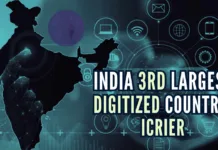
Government’s step in vision for an Aatmanirbhar Bharat
In a big policy reform in the country’s mapping policy, the Government of India (GOI) on Monday announced liberalisation of norms governing the acquisition and production of geospatial data. This new policy is a good move that will help in boosting innovation in the sector and create a level-playing field for public and private entities. Under the new guidelines, the sector will be deregulated and aspects such as prior approvals for surveying, mapping and for building applications based on that have been done away with, Department of Science and Technology Secretary Ashutosh Sharma said.
For Indian entities, there will be complete deregulation with no prior approvals, security clearances, licenses, for acquisition and production of geospatial data and geospatial data services, including maps, he said. Prime Minister Narendra Modi said the liberalisation of policies governing the acquisition and production of geospatial data is a “massive step in government’s vision for an Aatmanirbhar Bharat.” The reform will benefit the country’s farmers, start-ups, private sector, public sector and research institutions to drive innovations and build scalable solutions, he said.
Under the new guidelines, terrestrial mobile mapping survey, street view survey and surveying in Indian territorial waters will be permitted only to Indian entities irrespective of accuracy.
Science and Technology Minister Harsh Vardhan in a press conference said the easing of norms will greatly help in several sectors that were suffering because of non-availability of high-quality maps. “Availability of comprehensive, highly accurate, granular and constantly updated representation of geospatial data will significantly benefit diverse sectors of the economy, significantly boost innovation in the country and greatly enhance its preparedness for emergency response,” Vardhan said.
He said earlier even the Survey of India, the organisation entrusted with making maps, had to seek permission for mapping from different agencies, thus delaying its work by at least three-to-six months. In a series of tweets, Modi said, “Our government has taken a decision that will provide a huge impetus to Digital India. Liberalising policies governing the acquisition and production of geospatial data is a massive step in our vision for an Aatmanirbhar Bharat,” he said.
Vardhan explained that with the advent of publicly available geospatial services, a lot of geospatial data that used to be in the restricted zone are freely and commonly available now and some of the policies/ guidelines that used to regulate such information have been rendered obsolete and redundant.
Under the new guidelines, terrestrial mobile mapping survey, street view survey and surveying in Indian territorial waters will be permitted only to Indian entities irrespective of accuracy. All geospatial data produced using public funds, except classified geospatial data collected by security and law enforcement agencies, to be made accessible for scientific, economic and developmental purposes to all Indian entities and without any restrictions on their use.
Vardhan said due to this policy, the whole sector will open up in a big way and geospatial data of the value of Rs.1 lakh crores can be acquired and used by 2030. Talking about Google Maps, he said, “If we have to make our own services available, we have to liberalise, start collecting and using data.” Jitendra Singh, Minister of State for Department of Space, said the decision will enable India’s geo-mapping potentials to be used for a higher goal of India emerging as a frontline nation in all sectors and not confining to its geo-mapping capacities only for security purposes. Singh added that unshackling the geospatial sector would play a stimulating role for the space industry as this sector is at the core of cutting-edge technologies like 5G.
[with PTI inputs]
- Kotak Mahindra Bank shares tank 13%. Market Cap erodes by Rs.37,721 cr post-RBI action - April 25, 2024
- Indian IT services sector staring at second straight year of muted revenue growth: Crisil - April 25, 2024
- Subramanian Swamy approaches Supreme Court on Govt’s modification of 2G Scam Judgment to avoid auction of Satellite Spectrum - April 23, 2024










